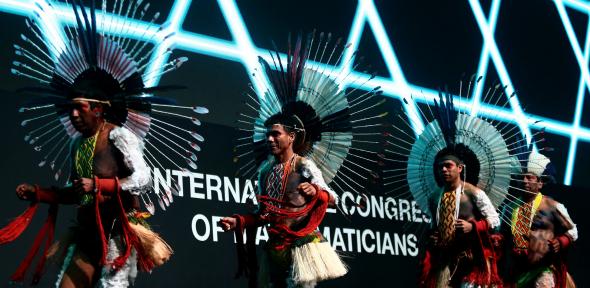
Every four years thousands of mathematicians gather for the International Congress of Mathematicians (ICM). As well as the award of a Fields Medal to Caucher Birkar, Professor of Mathematics in the Department of Pure Mathematics and Mathematical Statistics, at the opening ceremony, the Faculty was also particularly pleased that a number of Cambridge mathematicians had been invited speakers this year, recognising the importance of their work.
The ICM moves location each time, and this year was held for the first time in the Southern Hemisphere, in Rio de Janeiro in Brazil. Over 3,000 participants attended from 114 countries for a nine day program of lectures from across the spectrum of mathematics. The different plenaries and parallel sessions covered topics from logic to topology, and dynamical systems to the history of mathematics. We spoke with Jack Thorne, Clément Mouhot and Ivan Smith about their experience at the ICM.
Broadening mathematical cultures
Jack Thorne, Professor of Number Theory, gave an invited lecture on number theory about his work extending Andrew Wiles’ proof of Fermat's last theorem. Wiles proved that $x^n +y^n = z^n$ doesn't have any non-trivial integer solutions if $n$ is at least 3. "But number theorists care about all number systems, not just the integers," said Thorne. He spoke about his work exploring similar questions for other number systems.
"Most of the conferences I go to as a research mathematician are quite specialised," said Thorne. "The aim of this conference is very different." As the participants at an ICM come from every part of mathematics, lectures are delivered to a broad mathematical audience, enabling participants to hear about research from areas quite different to their own. "I have liked broadening my mathematical culture, going to other sessions and seeing the latest results in my field," said Clément Mouhot, Professor of Mathematical Sciences, who gave an invited lecture about his work in mathematical physics.
"Mathematics is a science of structures and the main equations of physics are some of the most beautiful structures we can find." Mouhot's lecture presented recent work he has done with collaborators in Chicago and Texas. "[It is] a new line of research we started about three years ago that is doing something that we like to do very much in mathematics, that is to bring different areas, different theories, together." The work is trying to solve some conjectures for a class of equations from physics called kinetic equations. "But the way we try to do this is maybe even more important than the questions we are trying to answer. We are trying to combine several major theories of the twentieth century of analysis of partial differential equations of the twentieth century, the main theories of Nash, Georgi, Moser and Hormander, to try and solve the questions."
Mathematical connections
The choice of speakers invited to the ICM can be an indication of developments within mathematics. "I think that often [who is invited] is reflective of a sense of certain subjects coming of age, and growing into their ascendance," said Ivan Smith, Professor of Geometry. "[The ICM] is very good to keep track of where that’s happening in other parts of mathematics, to get new ideas."
Smith gave an invited lecture on his research in symplectic topology. In geometry mathematicians tend to study manifolds – spaces that locally look very simple (locally they resemble Euclidean space) but might have some interesting or more complicated global structure. "A circle is a one dimensional manifold, the surface of a sphere or a doughnut is a two dimensional manifold." Mathematicians often put geometric structures on these manifolds. "For instance, you might be interested in measuring lengths or angles, that's Riemannian geometry. In symplectic topology, we think about the geometry of area."
Smith's lecture was about recent work he did at DPMMS with Nick Sheridan (now at Edinburgh). "There's a group of symmetries associated to such a space and we proved that for some of these spaces this group is much larger than you might have expected. And in particular much larger than it would be if you didn't keep account of this sort of symplectic structure. One thing that's very nice about this story is that the methods of proof go via connections to other subjects, in particular the bridge between differential and algebraic geometry (which is usually a more rigid subject, studying polynomials) comes from string theory, part of theoretical physics."
Personal connections
The ICM is also an opportunity to meet mathematicians from across the world. It encourages mathematicians from all countries to participate, and increasingly there are grants available to enable mathematicians from the developing world to attend. This aspect of the ICM was one of the highlights for Mouhot: "I like the fact that mathematics is very international. It shows internationalism beyond language, religion, culture, and that is really great."
Ultimately, it is the personal interactions that were the highlight for all the participants. "At the heart of it is the fact that maths is really a very social discipline," says Thorne. The congress celebrates winners of some of the biggest prizes in mathematics, but none of these amazing stars could exist in isolation. "You need other mathematicians to give your own work meaning – because if there's no-one to interpret and respond to what you're doing, it wouldn’t make sense. You can't have Pythagoras without Pythagoreans."
Changes in technology over the last century, both in transport and communication, have made it much easier for mathematicians to communicate and to collaborate. But in the end, nothing beats face-to-face interactions with your colleagues, and the ICM offers mathematicians an exciting opportunity for that. "To have people coming together to celebrate, to recognise excellence in mathematics, to meet people whom you wouldn’t normally meet," says Thorne, "it's very important for the health of the subject. I'm very happy to be able to participate."
